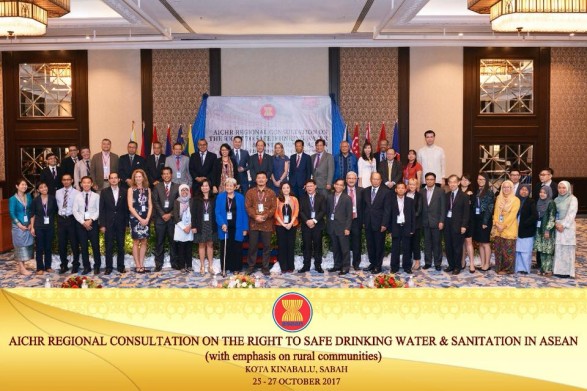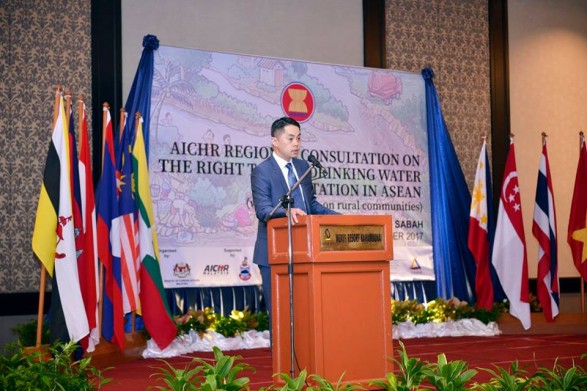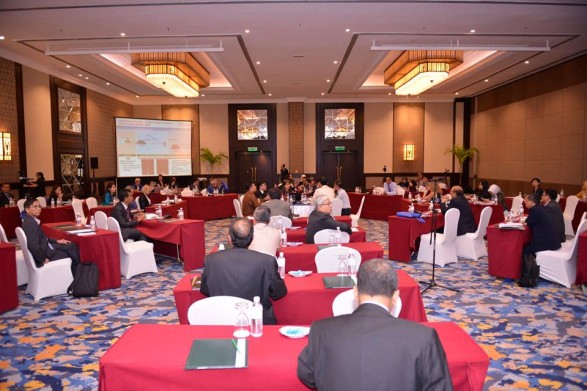Press Release: ASEAN Meets to Develop a Common Approach and Position on the Right to Safe Drinking Water & Sanitation Under Article 28(e) of the ASEAN Human Rights Declaration 2012 (AHRD)

KOTA KINABALU, SABAH, MALAYSIA, 25 to 27 October 2017 – The AICHR’s Regional Consultation on the Right to Safe Drinking Water & Sanitation in ASEAN (with emphasis on rural communities) gathered more than 50 stakeholders to discuss ASEAN Member States’ work in delivering safe drinking water and sanitation to the peoples of the region.
Among others, Government representatives from the Senior Officials Meeting on Rural Development and Poverty Eradication (SOMRDPE), the ASEAN Senior Officials on the Environment (ASOEN) and the ASEAN Working Group on Water Resources Management (AWGWRM); national health officials; and experts from the national human rights institutions of Malaysia, Myanmar, Indonesia and the Philippines, the United Nations Economic and Social Commission for Asia and the Pacific (UNESCAP), WaterLex, and the Asia Indigenous Peoples Pact (AIPP), shared country situations, experiences and challenges regarding the provision of safe drinking water and sanitation to rural communities.
The Right Honourable Tan Sri Datuk Seri Panglima Musa Haji Aman, the Sabah Chief Minister, in his Keynote Address (delivered by the Assistant Minister in the Chief Minister’s Department, the Honourable Datuk Ir. Edward Yong Oui Fah) encouraged the AICHR to “accelerate its work programmes to inspire the region by infusing into ASEAN’s framework a common set of human rights principles and good practices in handling the competing demands and needs especially for those in the rural communities”.

Earlier, His Excellency Edmund Bon Tai Soon, the Representative of Malaysia to the AICHR, said that there were operational challenges facing ASEAN where many still had no proper access to safe drinking water and sanitation.
“Article 4 of the AHRD declares that the rights of women, children, the elderly, persons with disabilities, migrant workers, and vulnerable and marginalised groups are inalienable, integral and indivisible part of human rights and fundamental freedoms.
“In our discussions therefore, we must not forget that many in ASEAN still have no proper access to safe drinking water and sanitation. The most vulnerable groups include asylum-seekers, refugees, displaced persons, ethnic minorities, trafficked persons, the indigenous and non-citizens.
“These groups are unable to realise the right to water and sanitation themselves by means they have at their disposal, and require assistance. We should stand in their shoes. We should attempt to see the issues from their perspective, and not from comfort or from cloistered surroundings,” Bon said.
Ms. Virginia B. Dandan, the former United Nations Independent Expert on International Solidarity and the former Chairperson of the United Nations Committee on Economic, Social and Cultural Rights (UNCESCR) called on the delegates to “deliberate on what it means for ASEAN to have a right to safe drinking water and sanitation”.
“We could perhaps explore what it means for water and sanitation to be available, accessible, affordable, acceptable and of good quality in the ASEAN context. We must consider not just water but also sanitation – what commonalities do they have and how do we bring these principles together so that they will mean something as a system. We must also not forget hygiene, which perhaps can also be brought into consideration somewhere along the way.
“When we are doing this, let us not forget to pay attention to the gender dimension in the enjoyment of the right to safe drinking water and sanitation. Achieving equality in safe, available, accessible and affordable water, sanitation and hygiene; can serve as an entry point to ensure that women and girls fully enjoy this right,” Dandan said.

Dandan also urged the meeting to come up with an interpretation and understanding of what Article 28(e) of the AHRD means. “That’s first base, and it would be a great accomplishment.”
The following conclusions were emphasised and noted during the robust discussions:
- Article 28(e) of the AHRD guarantees the right to safe drinking water and sanitation as part of a person’s right to an adequate standard of living;
- Sustainable Development Goal 6 (SDG 6) seeks to ensure universal, equitable and adequate access to water, sanitation and hygiene for all by 2030;
- under international human rights law, States are obliged to respect (by refraining from interfering directly or indirectly with the right), protect (by preventing third parties from interfering in any way with the right) and fulfil (by adopting necessary measures to fully realise the right) the right to water and sanitation;
- the right to safe drinking water and sanitation cross-cuts other levers of sustainable development such as non-discrimination, the right to health, the right to be free from poverty and the right to peace;
- while there has been rapid progress by all States in the region regarding the provision of water and sanitation, there are still challenges facing the poor, rural and indigenous communities to access safe drinking water and sanitation;
- these challenges may be overcome by the greater engagement and co-operation of ASEAN bodies such as the AICHR, ASOEN, AWGWRM, SOMRDPE and the Senior Officials Meeting on Health Development (SOMHD); and,
- the right to safe drinking water and sanitation requires that they must be available, accessible, affordable, acceptable, adequate and be of good quality.
It was proposed that a summary of the Consultation outlining the discussions including the applicable rights principles and ASEAN’s baseline position be drafted for further action.
The Consultation was organised and hosted by AICHR Malaysia, ASEAN-Malaysia National Secretariat, Ministry of Foreign Affairs Malaysia; with the support of the Sabah State Government, the Human Rights Commission of Malaysia (SUHAKAM), the Raoul Wallenberg Institute for Human Rights and Humanitarian Law (RWI), the Office of the United Nations High Commissioner for Human Rights (OHCHR), the Embassy of Switzerland in Indonesia and the Swedish International Development Cooperation Agency (SIDA).
For more information, see https://www.facebook.com/aichrmalaysia
